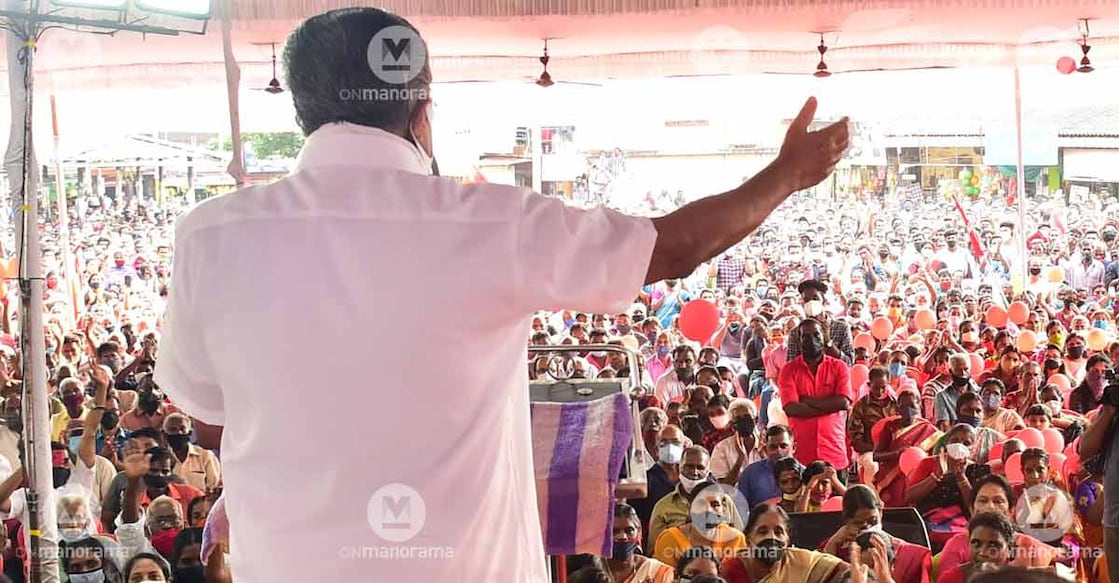Opinion | Trust quotient is key reason for Kerala's Red Salute

Mail This Article
The return to power of the ruling Left Democratic Front (LDF) in Kerala is due to a combination of factors, but 'trust quotient' remains the overwhelming trigger for this massive victory.
A majority of voters trusted the LDF to deliver, swaying them to offer a second chance to an incumbent government, which is unusual in the state which normally dabbles with the idea of voting out incumbent parties at the helm of power every five years.
The LDF positioned itself as a cohesive unit under an able leader who could steer the state through crises like recurrent floods and the Covid pandemic.
The Pinarayi Vijayan administration was seen as reliable for a majority of voters.
It also provided a soothing effect for all sections of the society by providing ration kits during the time Keralites were stuck to the confines of their homes as the pandemic raged.
The health care benefits offered by the administration and its stern measures in the aftermath of the Coronavirus outbreak was lauded across the country. It turned out to be reassuring to the state's voters also.
What dragged the Congress-led UDF is also the trust quotient, which was clearly missing in the Opposition camp.
The Congress even wanted the distribution of kits postponed just ahead of polls enraging a vast swath of voters across all income groups.
The UDF did not recognise the fact that all sections of the society availed the benefits of the free ration kits. The electorate did not buy the argument that the LDF government was not keen to shore up the state's finances by splurging on social welfare measures with ''borrowed money”.
Instead, they were probably glad with a government and its political masters in whom they saw a willingness to go to any extent to provide succour to the people, especially at the time of crises.
They saw a lack of disrespect for their aspirations when the government was attacked by the Congress-led UDF in tandem with the BJP, a charge levelled by the CPM-led LDF.
The adversaries of the BJP also may have perceived the LDF as a better bet to take on the saffron outfit as many Congress leaders were seen as fancying their chances of switching over to the Sangh camp if the UDF was defeated.
Fault lines in UDF
Congress leaders were too incapable of surviving without power in the centre or state for a long period and the party was likely to wither away if the LDF returned to power and BJP gets more space in the state's opposition arena, many thought.
The CPM and the CPI also dared to drop even performing ministers, including Thomas Isaac, G Sudhakaran, C Raveendranath and V S Sunilkumar, to give opportunities to fresh faces. This was perceived by Keralites as a bold move triggering a clamour in the opposition camp, especially the Congress, which was seen as inching towards the idea of renominating the ageing satraps, who always wanted a slice of power.
The young Congress leaders even went public with their demand, giving the impression that the Congress state leadership would rather maintain group equations and stick to tried and tested archaic politics.
The Congress high command had too ultimately put its foot down and strike down many names put forth by the trio of KPCC president, Opposition Leader and its former CM.
Rahul Gandhi made it unequivocally known to these leaders that more youth and women need to be given representation and group equations should not be considered in the selection of party candidates. Despite this directive, the Congress leadership could not come up with a single list of candidates. The late announcement of candidates did harm the prospects of the party in several constituencies as the LDF went far ahead with campaigning.
Electioneering woes
Although the Congress candidate list ultimately had an infusion of youth and women, by then it was trailing behind the CPM-led LDF and the BJP in electioneering.
The lack of funds also played spoilsport as several candidates were left to fend for themselves.
The KPCC was also perceived as succumbing to the fancies of its coalition partners, including the IUML and the Kerala Congress, by allocating more seats to the former and giving up key seats to the latter, which also triggered unrest among the Congress's dedicated cadres, especially in the Christian belt.
This is evident in the election results in districts like Kottayam, where the LDF made significant inroads. The backing the LDF got from Kerala Congress (M) also boosted its fortunes in several constituencies where it did not fare well in 2016 Assembly polls.
Unreliable bunch?
The opposition UDF was seen as unreliable grouping pulled in different directions by senior leaders. That is why the electorate did not pay heed to even seemingly serious charges levelled by Opposition leader Ramesh Chennithala. The voters did not probably feel that even the UDF or the top Congress leaders were not convincingly backing the Opposition leader. The UDF was seen more as a camp of bickering leaders with vested interests which wanted to nail a popular government. The average Keralite's aversion for BJP also came into play as the UDF leaders were seen as hobnobbing with the saffron outfit. A top Congress leader publicly claimed many top leaders would flock to BJP in the event of a defeat for the UDF, further cementing the suspicion that the Congress would be a 'B' team of the BJP.
The hype over the Congress's Nemom candidature also had an adverse impact across the state as top Congress leaders were seen as not keen to take up a challenging fight. The party had to supposedly seek the services of Vadakara MP K Muraleedharan. Earlier the Congress had said its sitting MPs wouldn't be contesting. This norm had to be relaxed and the electorate got a message that the top Congress leadership was not keen to make sacrifice to wrest a BJP seat. Instead, many Congress leaders were keen to latch on to their personal fiefdoms. If Oommen Chandy or Ramesh Chennithala had dared to take the plunge in Nemom, the message it would have sent out to the whole of Kerala would have been entirely different.
This also gave credence to the LDF's previous charge that the UDF had forfeited the Nemom seat in 20016, paving the way for the first BJP legislator's coronation in Kerala.
Cocoon of group equations
The UDF failed to gauge the warning signals emanating from the success of the LDF in the local body polls by going on denial mode.
The UDF leadership failed to realise the lack of an anti-incumbency feeling among the voters.
It sought to seek solace in some stats instead of marshalling its own resources and putting in place an organisational structure.
Instead, its leadership went into the cocoon of group equations hoping for a default victory like the 2019 Lok Sabha polls, but the voters clearly were in no mood to back a 'ragtag' coalition of vested interests.
The UDF camp could also not project a probable CM candidate, which confused voters and gave credence to an idea that there would be a tussle for power on the lines of group equations within the Congress in the event of a UDF victory. But that was not to happen.
Trust factor
The voters overwhelmingly voted for continuance of the LDF government, backing their trust instinct with the ruling coalition throwing the Congress state unit into disarray.
All sections of the society also wanted a 'supposedly neutral' government, which would not pamper certain power formations on the lines of caste connotations and religious moorings. They had to bet on the ruling LDF rather than the UDF on that count.
Perhaps, it is time for Rahul Gandhi to disband the present leadership and infuse some vitality into its ailing state unit or face decimation.


